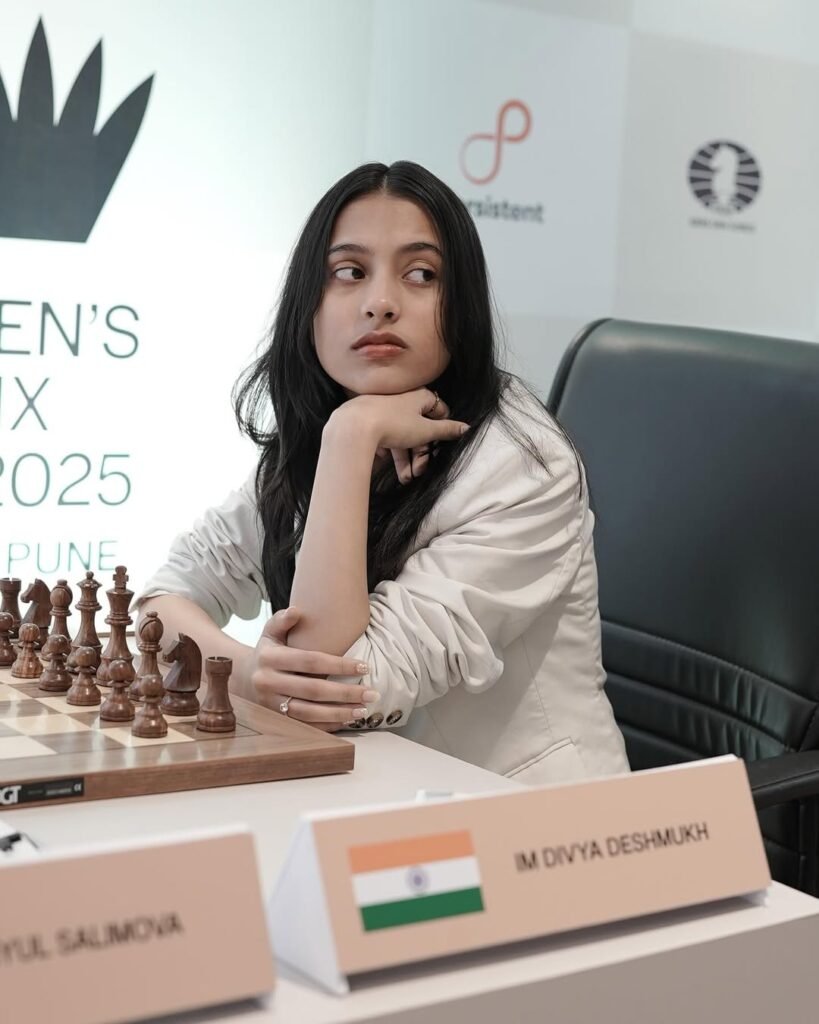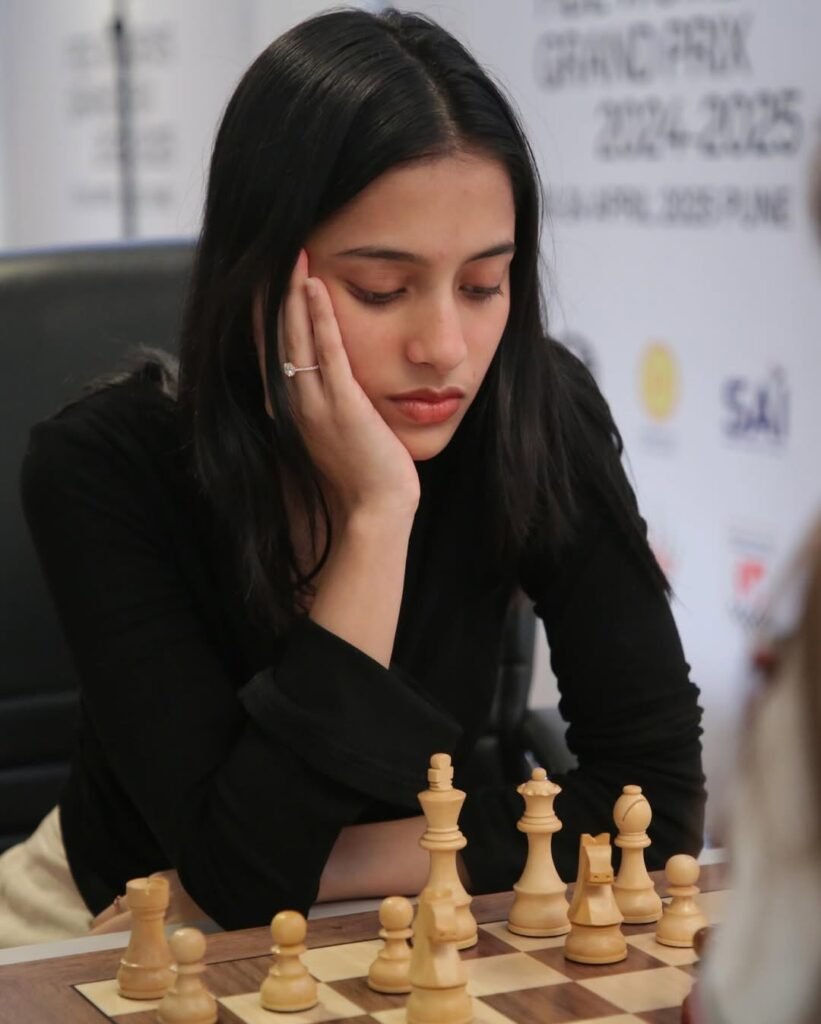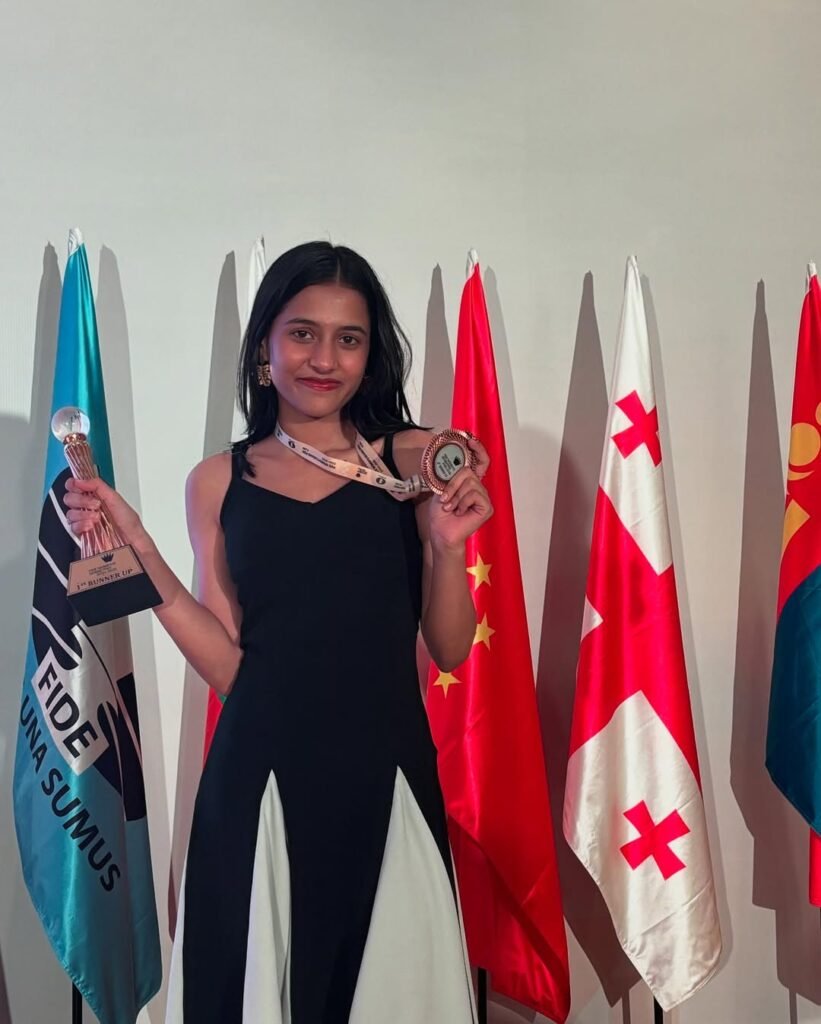Divya Deshmukh Crowned Chess Queen: India’s Global Dominance Shines in Batumi
In the heart of Batumi, Georgia, a 19-year-old prodigy from Nagpur, Maharashtra, etched her name into the annals of chess history. Divya Deshmukh’s triumph at the FIDE Women’s World Cup 2025, defeating compatriot and veteran Grandmaster Koneru Humpy in a thrilling tiebreak, marks a defining moment not just for her career but for Indian chess as a whole. This victory, a clash of generations between the youthful exuberance of Divya and the seasoned brilliance of Humpy, underscores India’s burgeoning dominance in global chess. From open tournaments to junior events and now the women’s circuit, India’s chess prowess is undeniable, and Divya’s crowning achievement is a testament to the nation’s depth of talent.
A Generational Showdown in Batumi
The FIDE Women’s World Cup 2025, held from July 6 to July 28 in Batumi, Georgia, brought together 107 of the world’s finest female chess players from 46 federations, including 17 of the top 20 globally ranked women. The tournament, a critical event in the World Championship cycle, offered a $50,000 first prize and three qualifying spots for the 2026 Candidates Tournament. For India, the event was historic: it marked the first time two Indian women, Koneru Humpy and Divya Deshmukh, faced off in the final, ensuring India’s first-ever Women’s World Cup title.
The final was dubbed a “generational clash” by chess enthusiasts and media alike. Koneru Humpy, 38, a two-time World Rapid Champion and India’s first female Grandmaster, stood as a towering figure in Indian chess. Having made a remarkable comeback after stepping away from the game to embrace motherhood, Humpy’s resilience and experience made her a favorite. On the other side was Divya, half Humpy’s age, a rising star who had already made waves by defeating top players like China’s Zhu Jiner and former World Champion Tan Zhongyi en route to the final.
Divya’s Meteoric Rise to the Final
Divya’s journey to the World Cup final was nothing short of spectacular. Entering as the 15th seed, she defied expectations by outplaying higher-ranked opponents with fearless attacking play and meticulous preparation. Her semifinal victory against Tan Zhongyi, a former Women’s World Champion, was a 101-move marathon that showcased her endurance and tactical brilliance. This win not only secured her a spot in the final but also earned her a Grandmaster norm and a place in the 2026 Candidates Tournament.

Divya’s earlier rounds were equally impressive. She knocked out China’s Zhu Jiner, the second seed, in the pre-quarterfinals and compatriot Harika Dronavalli in the quarterfinals, proving her mettle against both international and Indian heavyweights. Her performance in Batumi built on her previous successes, including an individual and team gold at the 2024 Chess Olympiad in Budapest and a victory over World No. 1 Hou Yifan in the 2024 World Rapid and Blitz Championship, a feat praised by Indian Prime Minister Narendra Modi.
The Final: A Battle of Wits and Nerves
The final between Divya and Humpy was a two-game classical match, with tiebreaks scheduled if needed. Game 1 saw Divya, playing with the white pieces, open with a surprising 1.d4, deviating from her usual 1.e4 to target Humpy’s Queen’s Gambit Declined. Early on, Divya gained a significant advantage, with engines favoring her position after move 11. However, a critical error on move 14, sacrificing her bishop instead of activating her queen, allowed Humpy to equalize. The game ended in a 41-move draw after Humpy’s precise defense and a series of queen checks forced a repetition. Divya’s disappointment was palpable, as she later admitted to missing key opportunities.

Game 2 was a tense affair, with Humpy opting for a Reti opening that evolved into an English Opening, met by Divya’s Agincourt defense. The game remained balanced until move 24, when Divya spent 19 minutes on a move, putting herself under pressure. Despite Humpy’s attempts to capitalize, Divya’s defensive composure led to another draw, pushing the match into rapid tiebreaks.
Tiebreaks: Divya’s Triumph Under Pressure
The tiebreaks, consisting of two 15+10 rapid games, were where Divya’s resilience shone. In the first game, Humpy surprised with the Petroff Defense, a line she hadn’t played since 2023. Divya’s bold 20.d5 move aimed to open lines, but Humpy’s tactical response led to a drawn endgame. The second game, however, was decisive. Humpy opened with the Catalan, and Divya responded with an aggressive 4…dxc4, 5…Bb4+ variation. Despite early passivity, Divya held an extra pawn into the middlegame. Humpy’s critical blunder on move 54, playing 54.Rxf4 instead of 54.Ke4, allowed Divya to advance her a-pawn, securing a match-winning advantage.
Divya’s composure under time pressure was key. While Humpy spent more time on her moves, Divya played swiftly, maintaining a time advantage that proved crucial in the high-stakes endgame. Her victory, sealed with a 1.5–0.5 score in the tiebreaks, earned her the $50,000 prize, the Women’s World Cup title, and an automatic Grandmaster title, making her India’s 88th Grandmaster and fourth female GM after Humpy, Harika Dronavalli, and Vaishali Rameshbabu.

India’s Chess Renaissance
Divya’s triumph is not an isolated achievement but part of a broader chess renaissance in India. The nation has emerged as a global powerhouse, driven by the legacy of five-time World Champion Viswanathan Anand. In 2024, India’s Open and Women’s teams won gold at the Chess Olympiad, with Gukesh Dommaraju, Arjun Erigaisi, Divya, and Vantika Agrawal earning individual golds. Gukesh, at 18, became the youngest World Chess Champion, defeating Ding Liren, while Praggnanandhaa R claimed titles in major tournaments like UzChess and Tata Steel Chess.
In the junior ranks, Pranav Venkatesh won the World Junior Championship, and India secured three gold medals in the Under-10 and Under-12 categories at the FIDE World Cup Cadets 2025 in Georgia. Arjun Erigaisi and Nihal Sarin continue to shine, with Erigaisi ranked world No. 5 and Gukesh defeating Magnus Carlsen in both rapid and classical formats, notably in Carlsen’s hometown of Stavanger, Norway.
A Symbol of Empowerment
Divya’s victory is more than a sporting triumph; it’s a symbol of empowerment for young women in India. Her journey from a junior champion to a World Cup winner at 19 inspires a new generation, particularly in a traditionally male-dominated sport. Experts attribute India’s chess success to improved coaching infrastructure, grassroots initiatives, and role models like Anand and Humpy, who have broken barriers and set new benchmarks.
Divya’s candid reflection post-victory—“I still need time to process it. I think it was fate, me getting the Grandmaster title this way”—captures her humility and determination. Her win, coupled with Humpy’s runner-up finish, ensures two Indian women in the 2026 Candidates Tournament, alongside Tan Zhongyi, raising hopes of an Indian challenger for the Women’s World Championship.
The Road to 2026
As the chess world turns its attention to 2026, Divya and Humpy will carry India’s hopes in the Candidates Tournament. A victory there could see an Indian woman challenge for the World Championship, further cementing India’s dominance. Divya’s fearless play and Humpy’s enduring excellence highlight the depth of Indian chess, a legacy built on talent, hard work, and an unyielding drive to succeed.
This all-Indian final in Batumi is a golden chapter in India’s chess story, a testament to a nation that can confidently say, “If anyone wins, it will be India.” As Divya Deshmukh lifts the FIDE Women’s World Cup trophy, she not only claims her place among the elite but also signals that Indian chess is here to rule the global stage for years to come.







